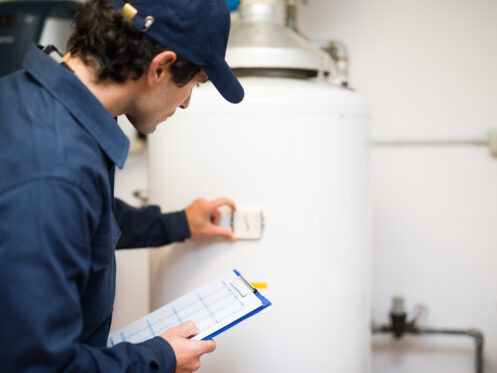Your home’s water heater is an essential appliance, but it’s also highly susceptible to rust. Like any metal, the components of your water heater can rust over time, leading to inefficient operation, potential damage and, eventually, the need for a replacement. But there are steps you can take to prevent rust and prolong the lifespan of your water heater.
First, understanding the process of rusting is vital. Rust occurs when iron or an iron alloy, such as steel, is exposed to moisture and oxygen for a prolonged period. This combination creates a chemical reaction known as oxidation, forming iron oxide or rust. In a water heater, this process can be accelerated by heat and certain minerals or impurities.
Preventing your water heater from rusting is not only about saving money on replacement costs. It’s also about ensuring the safety of your home and the quality of your water. A rusted water heater might leak, causing water damage to your property. Worse yet, rust in your water can lead to discoloration and a metallic taste.
Remember, while homeowners can take some preventive measures, it is always best to seek professional help to ensure your water heater is in optimal condition.
1. Regular Maintenance and Inspection
This process involves a professional thoroughly checking the water heater system at least once a year. They will inspect the anode rod, a component designed to attract corrosive elements, thus protecting the tank from rust. Over time, the anode rod gets corroded and needs replacement. Failing to replace it in time allows the corrosive elements to attack the tank, leading to rust.
Regular water heater maintenance also includes flushing the water heater tank. Sediments and minerals, particularly iron, accumulate in the tank over time. When heated, these elements separate from the water, settle at the bottom of the tank and can eventually cause rusting. Flushing the tank at least once a year helps remove these sediments and minerals, reducing the risk of rusting.
The professional will also look for any signs of water leaks during an inspection. Besides leading to water wastage, water leaks can hasten the rusting process. Some of the symptoms that you have a leaky water heater include a damp area around the base, a hissing sound or a faint odor from the tank. If you suspect any of these signs, immediate repairs should be done to prevent further damage.
The expert will also inspect the pressure relief valve, as a faulty valve can lead to an over-pressurized tank, which may result in cracks and leaks, creating an avenue for rust.
Finally, professional maintenance involves examining the water quality. Hard water, rich in minerals, can lead to faster corrosion and rusting. If your water is hard, the plumber might recommend installing a water softener to prolong the life of your water heater.
2. Insulating the Water Heater Tank
Insulating your water heater tank has numerous advantages. The insulation serves as a protective layer, reducing the tank’s exposure to temperature fluctuations and damp conditions that can accelerate corrosion. Furthermore, an insulated tank limits the condensation on the heater surface. This is significant because constant exposure to moisture can lead to rusting, particularly in metal tanks. Insulation also enhances the energy efficiency of your water heater by reducing heat loss. This means that the heater does not need to work as hard or as often to maintain the water at the desired temperature, which can prolong the life of your equipment.
Additionally, by reducing the heater’s workload, insulation minimizes the wear and tear on its components, lessening the chance of leaks, which can trigger rusting later on. Therefore, insulating your water heater tank is not just about improving its energy efficiency and performance but also about preserving its health and extending its lifespan by mitigating the risk of rust. At On Time Experts, we provide professional insulation services to protect your water heater against corrosion.
3. Setting the Proper Temperature
A common mistake that many homeowners make is setting their water heater’s temperature too high. The higher the temperature, the more the water heater has to work, and the more the metal tank expands and contracts. Those constant changes can weaken the tank, leading to cracks and, eventually, rust. Additionally, high temperatures can accelerate the sedimentation process, causing minerals to separate from the water and settle at the bottom of the tank, which can also contribute to rusting.
Therefore, setting your water heater temperature to a moderate level, usually around 120 degrees Fahrenheit, is recommended. This temperature is generally considered safe and efficient, minimizing the risk of scalding, reducing energy consumption and mitigating the potential for rust. Additionally, it’s crucial to avoid frequent temperature changes, as this can also wear out the tank. It’s advisable to consult with a professional at On Time Experts to help determine the optimal setting for your specific water heater and local water conditions.
4. Installing a Corrosion-Resistant Liner
This lining helps reduce the contact between water and steel, preventing the adverse reactions that occur when these two elements come into contact. That said, it’s essential to take into account your local water conditions and select a liner designed for that type of water.
For instance, if you have hard water with a high mineral content, the liner should be made from corrosion-resistant materials, such as stainless steel or copper. On the other hand, if you live in an area with soft water, a polyethylene, polymer-lined tank is more suitable. Relying on professional advice when selecting a corrosion-resistant liner will ensure you find the best solution for your particular water heater and water conditions.
5. Installing a Tankless Water Heater
If you’re looking for an efficient and rust-resistant way to heat your water, consider investing in a tankless water heater. As the name suggests, this type of heater doesn’t use a storage tank but instead heats up the water on demand. This eliminates any potential contact between the water and steel, meaning there is no risk of rust. Tankless water heaters are also incredibly efficient, using less energy than traditional heaters and providing a virtually endless supply of hot water.
Conclusion
Maintaining the robustness and efficiency of your water heater is ultimately a matter of proactive water heater maintenance, informed use and considered upgrades. Regular professional inspections and maintenance, proper insulation, correct temperature settings and the use of a corrosion-resistant liner all contribute to preventing rust and extending the lifespan of your tank.
It is always advisable to consult with professionals like us at On Time Experts to help you devise a tailored plan based on your specific water conditions and water heating needs. Our services include air conditioning, heating, plumbing, electrical and air quality. Our technicians and plumbers use the latest technology and tools to handle installations, repairs, tune-ups and even replacements of water heaters.
Contact us at On Time Experts today to learn more about how to protect your water heater from rust.

